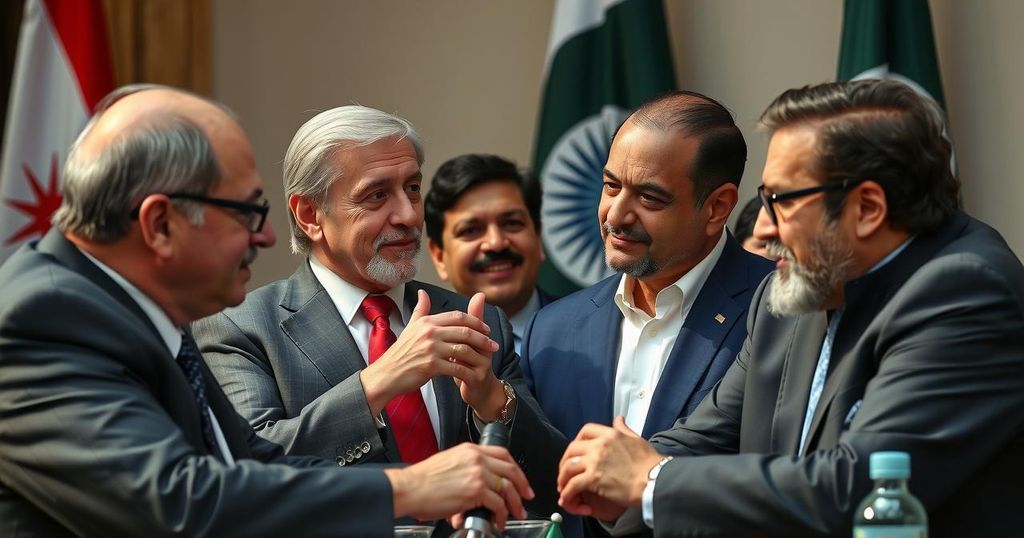Lessons from Argentina: Economic Reform and the Search for Leadership in Pakistan
Argentina and Pakistan share a history of economic turmoil, with Javier Milei’s recent reforms igniting discussions in Pakistan about the need for similar leadership. While Milei’s policies have effectively reduced inflation in Argentina, concerns regarding his views on democracy, economic history, and monetary control raise important questions for potential emulation in Pakistan’s context. Advocating for a nuanced understanding of economic reforms, the article stresses the importance of impartiality and comprehensive strategy in addressing economic challenges.
Argentina and Pakistan share striking similarities in their historical economic challenges, transitioning from prosperous beginnings to prolonged financial distress requiring International Monetary Fund (IMF) intervention. A year ago, Javier Milei emerged as a pivotal political figure in Argentina, bringing about an unexpected economic revival. His approach has drastically reduced inflation from an alarming 211 percent in December 2023 to single digits, captivating global attention. Milei’s strategies of downsizing government and deregulating markets resonate with some Pakistani intellectuals, advocating for a similar figure to address their nation’s arduous economic situation.
Milei’s insights, articulated in a podcast with Lex Friedman, provide valuable context regarding his successful economic reforms, focusing on eliminating wasteful bureaucracy and balancing fiscal budgets, which led to a significant drop in inflation and enhanced purchasing power for citizens. Notably, his critiques of price controls and discretionary government spending illuminate issues that equally impact Pakistan’s economy. However, this praise is met with concern due to his controversial views, particularly his favorable references to the U.S. and Israel as models of liberal democracy, which raises questions about his impartiality concerning the Palestinian plight.
Milei’s simplistic interpretation of economic history also merits scrutiny, particularly his assertions regarding the benefits of the Industrial Revolution compared to ancient Rome, which fail to recognize the harsh realities of that era. His enthusiastic embrace of Austrian economic principles, including a misrepresentation of Milton Friedman’s and Adam Smith’s philosophies, reflects a convoluted understanding that tends towards idealism rather than pragmatic solutions. His advocacy for dollarization, which suggests an entrustment of monetary control to the U.S. Federal Reserve, contradicts his libertarian ideals, raising doubts about his commitment to economic sovereignty.
In considering Pakistan’s challenges, it is evident that the country requires Milei’s tenacity in tackling the entrenched bureaucracies and regulations that hinder economic advancement. However, it is crucial that any leader embody a balanced approach, avoiding biases and misunderstandings that could lead to misguided policies. The pursuit of a Milei figure should focus on robust economic knowledge and a commitment to freedom without bias, ensuring a comprehensive strategy for revitalizing Pakistan’s future.
The economic trajectories of Argentina and Pakistan demonstrate similarities in experiencing cycles of growth followed by chaos and financial rescue from international bodies like the IMF. Argentina, once the envy of South America, has faced severe inflation and economic mismanagement over the decades. Javier Milei’s unexpected rise to power has marked a transformative phase in Argentina’s politics and economics, inspiring discussions in countries like Pakistan, where economic frustration persists. Through Milei, interest in economic reform and the need for leaders who challenge existing paradigms have gained traction.
In summation, both Argentina and Pakistan illustrate the complexities of navigating economic challenges amidst historical precedents. Javier Milei’s accomplishments evoke a vision of bold leadership that advocates for deregulation and fiscal responsibility, which aligns with the aspirations of several in Pakistan. Nonetheless, as Pakistan seeks to emulate aspects of Milei’s approach, it must remain vigilant against the pitfalls of biases and historical misunderstandings that could undermine reform efforts. A balanced approach, derived from empirical insights and free from ideological extremes, is paramount to achieving sustainable economic progress.
Original Source: www.dawn.com




Post Comment